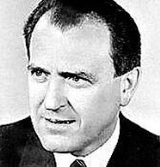
Vasil Bilak
Encyclopedia
RSDr. Vasiľ Biľak is a former Slovak Communist leader of Rusyn
origin.
Vasiľ Biľak was originally a tailor. In the years 1955–1968 and 1969–1971 he was a member of the Central Committee of the Communist Party of Slovakia
(ÚV KSS); in 1962–1968 he was the secretary and from January until August 1968 General secretary of ÚV KSS; from April 1968 until December 1988 a member of the Presidium of the Central Committee of the Communist Party of Czechoslovakia
(ÚV KSČ). From November 1968 until December 1988 he was a secretary of ÚV KSČ with significant influence on the foreign policy and the ideology of the party. In 1960–1989 he was a member of National Assembly, later Federal Assembly.
In 1968 he belonged to the exponents of the hardline
wing in the KSČ
; he supported the Soviet invasion and participated on the so called "normalisation process" after the political liberalization called the Prague Spring
.
He was one of the politicians who signed the invitation letter for the armies of Warsaw Pact
countries. In December 1989, he was suspended from the KSČ
. The Slovak Justice Minister Jan Carnogursky
said in 2001 he would not ask the Slovak President Rudolf Schuster
to grant an amnesty to Vasil Bilak, the Czechoslovak Communist Party ideologist charged with treason in connection with the "invitation" sent to Warsaw Pact countries to extend "brotherly help" to Czechoslovakia in 1968. In 2011, the trial process with Bilak ended unsuccessfully, when the attorney stopped it for lack of witnesses.
Rusyns
Carpatho-Rusyns are a primarily diasporic ethnic group who speak an Eastern Slavic language, or Ukrainian dialect, known as Rusyn. Carpatho-Rusyns descend from a minority of Ruthenians who did not adopt the use of the ethnonym "Ukrainian" in the early twentieth century...
origin.
Vasiľ Biľak was originally a tailor. In the years 1955–1968 and 1969–1971 he was a member of the Central Committee of the Communist Party of Slovakia
Communist Party of Slovakia (1939)
The Communist Party of Slovakia was a communist party in Slovakia. It was formed in March 1939, when the Slovak Republic was created, as the Slovak branches of the Communist Party of Czechoslovakia were separated from the mother party...
(ÚV KSS); in 1962–1968 he was the secretary and from January until August 1968 General secretary of ÚV KSS; from April 1968 until December 1988 a member of the Presidium of the Central Committee of the Communist Party of Czechoslovakia
Communist Party of Czechoslovakia
The Communist Party of Czechoslovakia, in Czech and in Slovak: Komunistická strana Československa was a Communist and Marxist-Leninist political party in Czechoslovakia that existed between 1921 and 1992....
(ÚV KSČ). From November 1968 until December 1988 he was a secretary of ÚV KSČ with significant influence on the foreign policy and the ideology of the party. In 1960–1989 he was a member of National Assembly, later Federal Assembly.
In 1968 he belonged to the exponents of the hardline
Hardline
In politics, hardline refers to the doctrine, policy, and posturing of a government or political body as being absolutist and sometimes authoritarian. The hardline position is usually extremist and uncompromising....
wing in the KSČ
Communist Party of Czechoslovakia
The Communist Party of Czechoslovakia, in Czech and in Slovak: Komunistická strana Československa was a Communist and Marxist-Leninist political party in Czechoslovakia that existed between 1921 and 1992....
; he supported the Soviet invasion and participated on the so called "normalisation process" after the political liberalization called the Prague Spring
Prague Spring
The Prague Spring was a period of political liberalization in Czechoslovakia during the era of its domination by the Soviet Union after World War II...
.
He was one of the politicians who signed the invitation letter for the armies of Warsaw Pact
Warsaw Pact
The Warsaw Treaty Organization of Friendship, Cooperation, and Mutual Assistance , or more commonly referred to as the Warsaw Pact, was a mutual defense treaty subscribed to by eight communist states in Eastern Europe...
countries. In December 1989, he was suspended from the KSČ
Communist Party of Czechoslovakia
The Communist Party of Czechoslovakia, in Czech and in Slovak: Komunistická strana Československa was a Communist and Marxist-Leninist political party in Czechoslovakia that existed between 1921 and 1992....
. The Slovak Justice Minister Jan Carnogursky
Ján Carnogurský
Ján Čarnogurský is a former Slovak politician, a former Prime Minister of Slovakia and the former chairman of the Christian Democratic Movement .He is married and has 4 children.- Before 1989 :...
said in 2001 he would not ask the Slovak President Rudolf Schuster
Rudolf Schuster
Rudolf Schuster was the second President of Slovakia . He was elected on 29 May 1999 and inaugurated on 15 June. Schuster was defeated in the presidential elections of April 2004, in which he ran as an independent...
to grant an amnesty to Vasil Bilak, the Czechoslovak Communist Party ideologist charged with treason in connection with the "invitation" sent to Warsaw Pact countries to extend "brotherly help" to Czechoslovakia in 1968. In 2011, the trial process with Bilak ended unsuccessfully, when the attorney stopped it for lack of witnesses.

